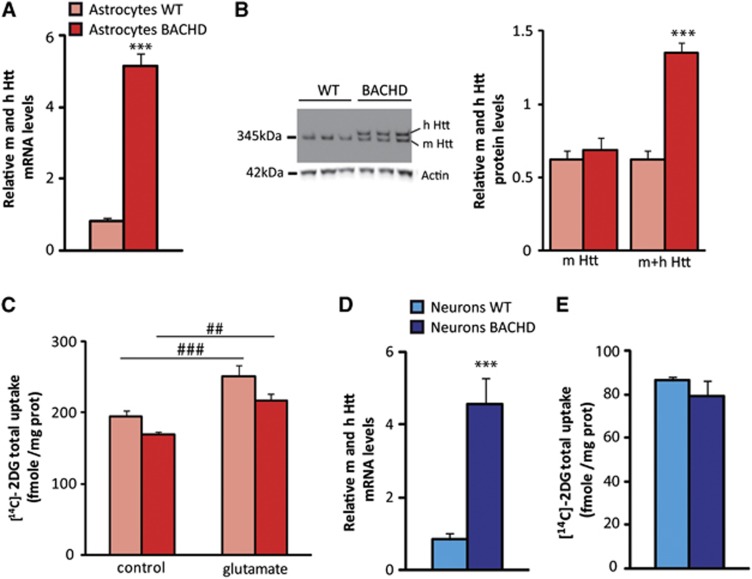Figure 3.
Mutant Htt does not directly affect energy metabolism in both neurons and astrocytes in vitro. Human mutant Htt is ubiquitously expressed in the brain of BACHD mice. (A, D) BACHD astrocytes and neurons express significantly higher levels ( × 5) of Htt mRNA compared with WT as measured by quantitative reverse transcription polymerase chain reaction (RT–qPCR) (astrocytes WT n=12, BACHD n=12, t-test P=1.9 × 10−13; neurons WT n=11, BACHD n=8, t-test P=1.18 × 10−8). (B) The protein level of Htt (human mutated (h) and mouse (m) form) is significantly higher in primary culture of astrocytes prepared from BACHD (n=5) compared with WT mice (n=7) as observed by immunoblotting (mouse Htt WT versus mouse Htt BACHD, t-test P=0.56; mouse+human Htt WT versus mouse+human Htt BACHD, t-test P=1 × 10−4). (C) Even if a global effect of astrocytes genotype was observed by two-way analysis of variance (ANOVA, astrocytes genotype) F(1,60)=8.27, P=0.006, glucose uptake in resting and glutamate-stimulated conditions was not significantly different between BACHD (n=16) and WT astrocytes (n=16; Scheffé post hoc test: WT control versus BACHD control P=0.3, WT glutamate versus BACHD glutamate P=0.1). The metabolic response induced by glutamate was maintained (+29%) in both conditions (two-way ANOVA (glutamate treatment) F(1,60)=25.14; P=1 × 10−5; Scheffé post hoc test: WT control versus WT glutamate P=0.0044, BACHD control versus BACHD glutamate P=0.019). (E) Glucose uptake was not significantly altered in BACHD neurons (n=8) compared with WT (n=7; t-test, P=0.33). All data represent means±s.e.m. #P<0.05 and ##P<0.005 compared with control; ***P<0.001 compared with WT. 2-DG, [14C]-2-Deoxyglucose; Htt, huntingtin; WT, wild-type.

